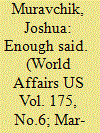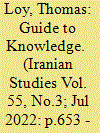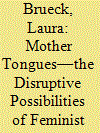|
|
|
Sort Order |
|
|
|
Items / Page
|
|
|
|
|
|
|
| Srl | Item |
| 1 |
ID:
125197


|
|
|
|
|
| Publication |
2013.
|
| Summary/Abstract |
Columbia University's English Department may seem a surprising place from which to move the world, but this is what Professor Edward Said accomplished. He not only transformed the West's perception of the Israel-Arab conflict, he also led the way toward a new, post-socialist life for leftism in which the proletariat was replaced by "people of color" as the redeemers of humankind. During the ten years that have passed since his death there have been no signs that his extraordinary influence is diminishing.
|
|
|
|
|
|
|
|
|
|
|
|
|
|
|
|
| 2 |
ID:
111517


|
|
|
|
|
| Publication |
2012.
|
| Summary/Abstract |
Through a brief history of a widely published canon debate in nineteenth century Orissa, this article describes how anxieties about the quality of 'traditional' Oriya literature served as a site for imagining a cohesive Oriya public who would become the consumers and beneficiaries of a new, modernized Oriya-language canon. A public controversy about the status of Oriya literature was initiated in the 1890s with the publication of a serialized critique of the works of Upendra Bhanja, a very popular pre-colonial Oriya poet. The critic argued that Bhanja's writing was not true poetry, that it did not speak to the contemporary era, and that it featured embarrassingly detailed discussions of obscene material. By unpacking the terms of this criticism and Oriya responses to it, I reveal how at the heart of these discussions were concerns about community building that presupposed a new kind of readership of literature in the Oriya language. Ultimately, this article offers a longer, regional history to the emerging concern of post-colonial scholarship with relationships between publication histories, readerships, and broader ideas of community - local, Indian, and global.
|
|
|
|
|
|
|
|
|
|
|
|
|
|
|
|
| 3 |
ID:
185876


|
|
|
|
|
| Summary/Abstract |
Despite being in operation for a mere five years, the Soviet-era Tajik (Persian) journal Rahbar-i Dānish (1927–1932) was a key venue for exploring and debating the merits of Tajik literature in the context of new ideological and literary trends. Established litterateurs as well as literary newcomers published examples of their literature and literary criticism in this first Tajik monthly social, educational, and literary journal. The present article reviews the history of Rahbar-i Dānish and some of its authors to trace their influence on Tajik literature and literary criticism in the late 1920s and early 1930s. The article addresses the difficulties of creating a Soviet Tajik literature and scrutinizes the various genres featured in the literary section of the journal. Finally, it presents the trajectories of two literary newcomers, Jalāl al-Dīn Ikrām (who later became known as Jalol Ikromi) and Baḥr al-Dīn ʿAzīzī (who died in a Soviet prison in 1944), whose short stories were most prominent in Rahbar-i Dānish. This article is based on an almost complete set of the forty-five issues of the journal, published between August 1927 and March 1932.
|
|
|
|
|
|
|
|
|
|
|
|
|
|
|
|
| 4 |
ID:
175490


|
|
|
|
|
| Summary/Abstract |
This essay considers the methodological intervention of understanding a ‘mother tongue’ (matribhasha) as a gendered vernacular. It seeks to illustrate the subversive potential of the vernacular as a gendered lens though which we can understand the Dalit feminist critiques of caste hierarchies and Dalit and non-Dalit patriarchies, and the places they intersect. The essay considers the works of Anita Bharti and Meena Kandasamy, contemporary Dalit women authors who write in Hindi and English, respectively. Thus, this paper extends the definition of the vernacular beyond the confines of linguistic and regional specificity, allowing for a feminist reclamation of the term.
|
|
|
|
|
|
|
|
|
|
|
|
|
|
|
|
| 5 |
ID:
193011


|
|
|
|
|
| Summary/Abstract |
In Fi al-adab al-sahyuni (On Zionist Literature, 1967)Footnote1, the Palestinian writer and Popular Front for the Liberation of Palestine (PFLP) spokesperson Ghassan Kanafani provides an analysis of Zionist literary production from the early nineteenth century through the mid-twentieth century, situating it in a broader schema of Western imperialism, settler colonialism, and dispossession in Palestine. Through a treatment of the early Zionist texts, Kanafani’s study traces the evolution of literary representations of the Jewish subject and explores their utility in repudiating integration and advancing racial supremacist logics. The Zionist works in question venerate different relationships to land—extractive, romantic, fraudulent—in contrast to those of Palestinian literary and oral traditions; the former are connected to the ongoing, material efforts of colonizing Palestine. Kanafani’s study was drafted in Beirut and is a reflection of the broader sweep of Arab nationalist and anti-colonial cultural production during the 1960s and 1970s, which was targeted by an anti-communist West. These experiences were formative for Kanafani’s intellectual project, which sees literary criticism as a revolutionary tool and a direct extension of armed resistance, whereby a cultural reconstitution can be used in service of liberating both Palestinian land and people. Kanafani’s study suggests that the “weapons” of literary production will be most effectively brandished by the Arab youth who lead the struggle against Zionism.
|
|
|
|
|
|
|
|
|
|
|
|
|
|
|
|
| 6 |
ID:
156627


|
|
|
|
|
| Summary/Abstract |
: Youssef Ziedan’s controversial novel Azazeel follows an anonymous narrator’s
journey from Upper Egypt to Aleppo during the first half of the fifth-century AD. This article
argues that descriptions of landscape enable the narrator to articulate personal and
historical crises otherwise censored or repressed. By incorporating geographical features
into his identity, the narrator creates a poetic version of himself free from the hegemony
of the dominant religious discourse. The search for a free, private space shapes the novel’s
aesthetic as well as political concerns. Overall, Azazeel is an important novel because of its
literary value, its denouncement of geopolitical definitions of God, and its ability to place
the history of religious violence in Egypt within the global context
|
|
|
|
|
|
|
|
|
|
|
|
|
|
|
|
|
|
|
|
|